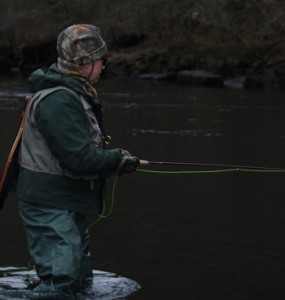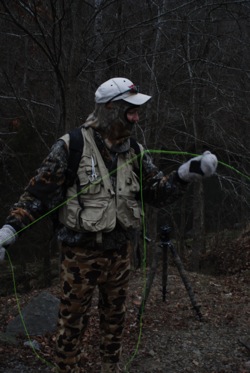 I pushed the wheelbarrow out to the woodpile and the air felt like it does before snow comes in – heavy, wet and still. And it made me think of fly fishing and that I really wouldn’t want to be fly fishing like I was two years ago at this time on the Little Red River in Arkansas, because it was cold … and I had a throbbing sinus infection.
I pushed the wheelbarrow out to the woodpile and the air felt like it does before snow comes in – heavy, wet and still. And it made me think of fly fishing and that I really wouldn’t want to be fly fishing like I was two years ago at this time on the Little Red River in Arkansas, because it was cold … and I had a throbbing sinus infection.
How cold was it?
It was so cold that my fly line froze in mid air.
It was so cold that I couldn’t get my fingers to tie any knots.
And, gasp, it was so cold that my guide quit before I did!

That assignment took a lot out of me. It took three trips to get it right! First, I pitched it as a destination piece to Fly Fisherman magazine and traveled to Arkansas in the fall, wrote it up and sent it in. Then, the editor wanted it to be a technical piece, saying words like “I want you to tell me what type of midge to fish with in the spring” and so on and so forth. I’m just learning to watch hatches, so I knew I’d need to rely on a great guide to talk me through the whole “let’s-fish-the-river-in-every-season” angle.
Thank the good Lord for Jared Lindsey, of Lindsey’s Resort, who exhibited a lot of patience and guided me on all three trips. I went back to the Little Red in January and froze my patooties and my fly line and then, I moseyed over again after turkey hunting in Arkansas that spring.
What a river …

Intense or frozen? Babbs on the Little Red in January. You can bet she's got heat packs in her hat and neck gator. Photo by Dian Cooper.
Arkansas titillated world news in 1992. In May, the Little Red River gave up the world-record brown trout — caught by a local named Rip Collins. The following November the country elected a self-touted good old boy from Hope, Ark., William Jefferson Clinton, as its 42nd president. Both events have not been long forgotten. Clinton is still a newsmaker and the Little Red’s record brown trout is the one to beat.
The Little Red River flows from the base of Greers Ferry Dam near Heber Springs to merge with the White River, aka the big daddy of trout fishing in Arkansas. Its most popular stretch—from the dam to Ramsey Public Access—offers 29 eclectic miles of fly fishing for mostly rainbows and browns, but occasional brookies and even cutthroats can be found. Purportedly, you can go for a slam in this river, and maybe even catch a cuttbow hybrid. With about 10,000 fish per mile, maybe you could settle for a triple play with rainbow, brown, and brookie.

Here's outdoor photographer Glenn Wheeler, aka Ninja Turtle Man, on the banks of the Little Red. Photo by Dian Cooper.
The river also offers several access points that vary in terrain as well as trout you’ll catch. However, you must be able to cope with high water any time and take to a boat, especially if full power generation is in progress. If wading, keep track of landmarks, in case generation begins and you’re in deep somewhere. The water can rise as high as eight feet in two hours.
During one of my many times on the river, the floodgates of the dam opened and we watched in amazement as the water level and our boat rose fast and the temperature of the river dropped a bit.
JFK was here …
Not only was the fishing good here – and it is good all year round – but the area is rife with history. And it’s poignant stuff, really. President John F. Kennedy stood on a platform on a bluff overlooking the newly created Little Red River and Greers Ferry Dam near Heber Springs on October 3, 1963. It was to be his last public appearance before his fateful trip to Dallas the following month.
In his dedication speech for the 40,000-acre lake project, Kennedy questioned the critics’ labeling of the undertaking as Congressional pork and asked,
“Which is more wasteful: the waste of life and property and hope or a multi-purpose project which can be used by all of our people? Which is more wasteful: to fail to tap the energies of that river, to let that water flood, to deny this chance for the development of recreation and power, or to use it and to use it wisely? Which is more wasteful: to let the land wash away, to let it lie arid, or to use it and use it wisely and to make those investments which will make this a richer State and country in the years to come?”
Several years later, those questions have disappeared – like the foam on the river that day – as thousands of anglers return every year to bask in the ethereal beauty of the river that teems with trout and natural scenic beauty.
Visitors may spend a quiet moment where JFK stood and where so much water has flowed by this historic place. I know I did.
Then, I went back out to pay further tribute to Kennedy’s words: I went fishing.
~Barbara Baird
Note: Dian Cooper, of Outside Again Blog, did the photography published here. Jason Baird and Glenn Wheeler submitted and sold photographs to accompany the article, which ran in March 2009.
Twitter: http://twitter.com/babbsbaird
Facebook: http://facebook.com/babbsthewon
Publisher/Editor Barbara Baird is a freelance writer in hunting, shooting and outdoor markets. Her bylines are found at several top hunting and shooting publications. She also is a travel writer, and you can follow her at https://www.ozarkian.com. View all posts by Barbara Baird
I was just out freezing my, umm, waders off yesterday so I know exactly what you mean. Loved this little look into your work for Fly fisherman Magazine. The history of your river has inspired me to look into the history of my state rivers. I’ve always thought every river has a story to tell….your river is rich in history ~
Rebecca,
Nice to know someone else can relate! Thanks for the comments and you’re right about rivers and their histories … heck, even little creeks have stories behind their names! You should write about your rivers.
Great write-up! Perhaps my favorite river in all of Arkansas.
Kevin
ArkansasOutdoorsOnline.com